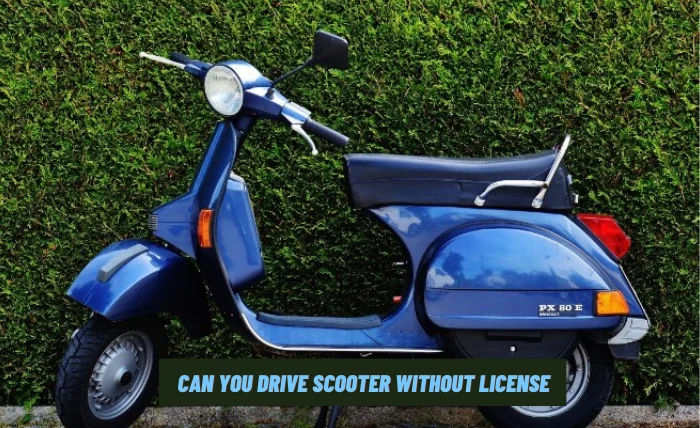Zipping around on electric or gas scooters looks fun and easy. But before hopping on one to cruise your neighborhood, knowing if a driver’s license is legally required where you live is essential. Some states require a motorcycle license to operate any motorized two-wheeler. The specific regulations regarding license types help avoid getting ticketed or having your uninsured scooter impounded.
This article clearly explains license requirements for operating different scooter types in the U.S. and internationally. We’ll cover minimum ages, license classes, safety laws, and penalties you may face for driving an unlicensed scooter on public roads.
Table of Contents
Can You Drive Scooter Without License? The Legal Landscape

Navigating the legal landscape is the first step in understanding if you can drive a scooter without a license. Regulations vary across different regions, so it’s essential to research the specific laws in your area. In many places, a valid driver’s license or a special license is required to operate a motorized scooter legally.
In some cases, scooters below a specific engine capacity may be exempt from licensing requirements. However, it’s crucial to check and adhere to local regulations to avoid legal consequences. Always remember ignorance of the law is not an excuse.
Mastering the Basics
Safety should remain a top priority even if local regulations allow scooter operation without a license. Riding a scooter requires a set of skills and knowledge about road safety. Consider enrolling in a motorcycle safety course to familiarize yourself with basic maneuvers, traffic rules, and emergency procedures.
Wearing appropriate safety gear, such as helmets, gloves, and protective clothing, is non-negotiable. Understanding the mechanics of your scooter and regularly maintaining it ensures a safe and enjoyable riding experience.
Unlicensed Riding Risks
While cruising on a scooter without a license may seem liberating, it comes with inherent risks. If caught riding without a valid license, you could face fines, penalties, and legal consequences. Additionally, insurance may not cover accidents or damages incurred while operating a scooter without proper licensing.
Being aware of the potential risks allows you to make an informed decision. It’s essential to weigh the thrill of unlicensed riding against the potential consequences and make a choice that aligns with your sense of adventure and responsibility.
Exploring Alternative
If obtaining a license proves challenging or if you prefer not to go through the licensing process, consider alternative transportation options. Electric scooters, bicycles, and public transportation are viable choices that offer convenience without the legal complexities of operating a motorized scooter without a license.
Electric scooters, mainly, have gained popularity as eco-friendly and cost-effective alternatives. Many cities have scooter-sharing programs that allow you to enjoy the benefits of scooter travel without the long-term commitment or licensing requirements.
The Advantages and Disadvantages of Unlicensed Scooter Riding
Flexibility and Convenience
Unlicensed scooter riding provides unmatched flexibility, allowing you to navigate through traffic and reach your destination swiftly. The convenience of parking in tight spaces adds an extra layer of appeal.
Cost Savings
Avoiding the expenses associated with obtaining a scooter license can be a significant financial benefit. Unlicensed riding eliminates the need for courses, exams, and licensing fees.
Reduced Bureaucratic Hassles
Unlicensed scooter riding offers a simpler alternative for those looking to avoid bureaucratic hurdles. It eliminates the need for dealing with government agencies and paperwork.
Legal Consequences
The most significant drawback is the potential legal consequences. If caught riding without a license, you may face fines, penalties, and legal actions that can tarnish your driving record.
Limited Coverage
Insurance may not cover accidents or damages incurred while riding without a license. This lack of coverage exposes you to potential financial burdens in the event of an accident.
Safety Concerns
Unlicensed riders may lack the necessary skills and knowledge for safe scooter operation. This increases the risk of accidents, injuries, and harm to the rider and others on the road.
Heading Tags for In-Depth Insight Local Regulations
Navigating local regulations is the foundation for legally operating a scooter. Research the specific legal requirements in your area to ensure compliance.
Scooter License Exemptions
Explore exemptions related to scooter licensing based on engine capacity and local laws. These exemptions are crucial for informed decision-making.
Consequences of Ignoring Regulations
Delve into the potential consequences of ignoring scooter licensing regulations. Being aware of the risks enhances your understanding of the legal landscape.
Staying Updated on Changes
Regulations can change over time. Stay informed about any updates or modifications to scooter licensing requirements in your region.
Seeking Legal Advice
When in doubt, seek legal advice to gain a comprehensive understanding of the legal implications of scooter operation without a license.
Enrolling in Safety Courses
Consider enrolling in safety courses to enhance your riding skills and knowledge of road safety. These courses provide valuable insights for both novice and experienced riders.
Importance of Protective Gear
Highlight the significance of wearing protective gear, including helmets, gloves, and appropriate clothing. Emphasize that safety gear is a non-negotiable aspect of scooter riding.
Regular Maintenance Checks
Underscore the importance of regular maintenance checks to ensure the proper functioning of the scooter. Maintenance contributes to a safer and more reliable riding experience.
Emergency Procedures
Provide information on essential emergency procedures, including braking techniques, evasive maneuvers, and how to handle unexpected situations on the road.
Bottom Line
Can you drive a scooter without a license? demands careful consideration of legal, safety, and personal factors. While unlicensed scooter riding offers flexibility and cost savings, the associated legal consequences, limited insurance coverage, and safety concerns must not be overlooked. Ultimately, making an informed choice aligns with both the thrill of adventure and the responsibility of ensuring a safe and enjoyable riding experience.
